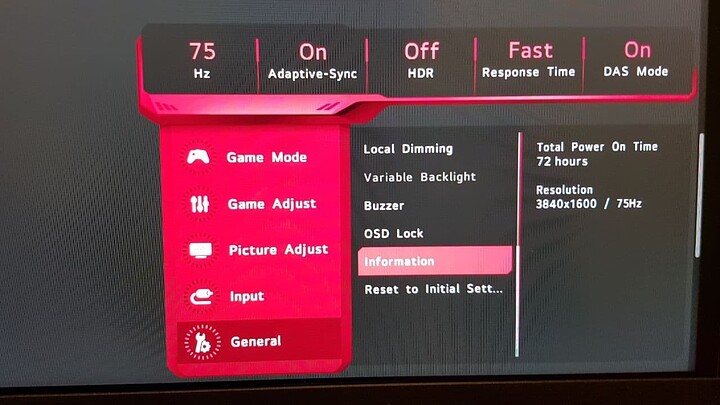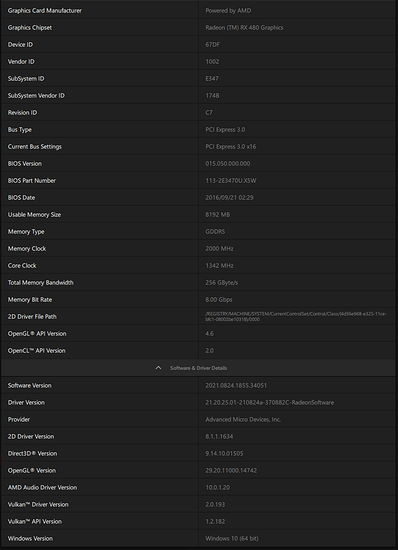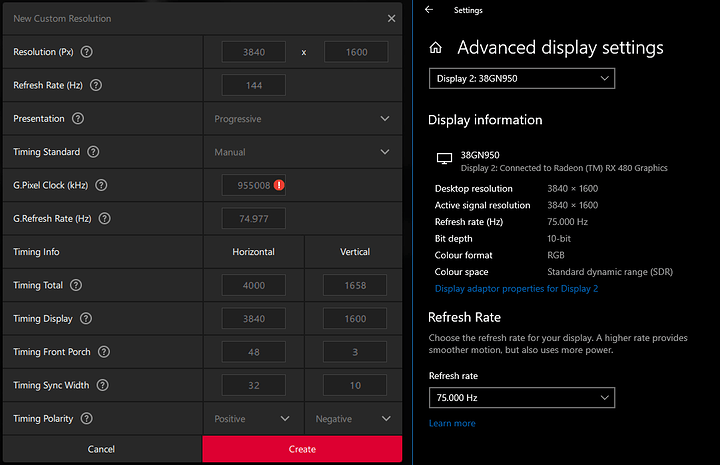My Hardware:
- CPU: AMD Ryzen Threadripper 1950X
- RAM: 2x16GB Crucial Ballistix Sport LT V2 DDR4-3200 (XMP 2.0 profile)
- Mainboard: ASRock X399 Taichi
- PSU: beQuiet Dark Power Pro 11
- GPU: An old 8GB Sapphire Radeon RX 480 Nitro+ OC Active PCIe 3.0 x16 1xDVI / 2xDisplayPort / 2xHDMI 2.0 (Lite Retail). Sadly I don’t have any other GPU to see if it’s the GPU that causes the problem.
Monitors: LG UltraGear 38GN950-B ; Asus MG279Q ; an old 1080p TV
The Problem:
I can’t use my LG UltraGear 38GN950-B with anything higher than 75Hz. Windows doesn’t display the option. Manjaro does allow me to set the refresh rate to 144Hz, but then the monitor looses the signal and after some time it resets back 75Hz. When I turn on HDR, Windows tells me the monitor is using 75Hz while the monitor itself tells me it’s using 60Hz in HDR mode.
- LG UltraGear 38GN950-B Display Port
- Asus MG279Q Display Port to Mini Display Port (MiniDP for the monitor)
- 1080p TV: HDMI , currently turned off
What I’ve tried/checked so far:
The list might be a bit long as I’ve also asked a few people about this issue. Please note that I don’t really know what the log messages of dmesg try to tell me, thought those people I asked seem not to think that they are related:
- The OSD menu of my monitor is set to use DP 1.4 (other options would be 1.1 and 1.2) and the resolution is set to 3480x1600p.
- I use the monitor with the PSU that came with the monitor.
- I checked it with the cable that came with the monitor and with the following cable
- The AMD driver software under Windows tells me the monitor is connected via 5.4Gbps x4 via DP.
- Setting the color depth from 10bit down to 8bit doesn’t change anything.
- Turning off adaptive sync (under Windows) doesn’t change anything.
Everything below was tested with the following cable:
After trying out this command: # echo "4 0x1e" > /sys/kernel/debug/dri/0/DP-2/link_settings:
# cat /sys/kernel/debug/dri/0/DP-1/link_settings
Current: 4 0x14 0 Verified: 4 0x14 0 Reported: 4 0x14 16 Preferred: 0 0x0 0
# cat /sys/kernel/debug/dri/0/DP-2/link_settings
Current: 4 0x14 0 Verified: 4 0x1e 0 Reported: 4 0x1e 16 Preferred: 0 0x0 0
With the following dsmeg: dmesg-output.txt (130.8 KB)
Another try:
echo 0xf > /sys/module/drm/parameters/debug
reboot
echo "4 0x1e" > /sys/kernel/debug/dri/0/DP-2/link_settings
Results in this:
Output of dmesg.. only the relevant part after the commands above
Yep, ------------[ cut here ]------------ was part of the dmseg message.
[ 164.423923] ------------[ cut here ]------------
[ 164.423928] Buffer overflow detected (8 < 192)!
[ 164.423939] WARNING: CPU: 27 PID: 2102 at include/linux/thread_info.h:199 ethtool_rxnfc_copy_to_user+0x2b/0xb0
[ 164.423947] Modules linked in: rfcomm qrtr ns cmac algif_hash algif_skcipher af_alg bnep btusb snd_usb_audio btrtl btbcm snd_usbmidi_lib btintel snd_rawmidi snd_seq_device bluetooth mousedev joydev mc ecdh_generic ecc iwlmvm amdgpu intel_rapl_msr snd_hda_codec_realtek mac80211 snd_hda_codec_generic intel_rapl_common squashfs wmi_bmof mxm_wmi snd_hda_codec_ca0132 snd_hda_codec_hdmi ledtrig_audio libarc4 gpu_sched snd_hda_intel edac_mce_amd drm_ttm_helper snd_intel_dspcfg iwlwifi ttm snd_intel_sdw_acpi snd_hda_codec kvm_amd ext4 drm_kms_helper cfg80211 snd_hda_core kvm snd_hwdep snd_pcm crc16 mbcache vfat cec fat jbd2 snd_timer igb syscopyarea snd sysfillrect sp5100_tco sysimgblt irqbypass pcspkr fb_sys_fops k10temp i2c_piix4 soundcore rapl i2c_algo_bit rfkill dca wmi gpio_amdpt gpio_generic pinctrl_amd mac_hid acpi_cpufreq loop drm crypto_user fuse agpgart ip_tables x_tables btrfs blake2b_generic libcrc32c crc32c_generic xor raid6_pq usbhid dm_crypt cbc encrypted_keys dm_mod trusted
[ 164.424026] asn1_encoder tee tpm crct10dif_pclmul crc32_pclmul crc32c_intel ghash_clmulni_intel aesni_intel crypto_simd cryptd ccp rng_core xhci_pci
[ 164.424037] CPU: 27 PID: 2102 Comm: nmbd Tainted: G W 5.13.19-2-MANJARO #1
[ 164.424041] Hardware name: To Be Filled By O.E.M. To Be Filled By O.E.M./X399 Taichi, BIOS P3.60 02/19/2019
[ 164.424042] RIP: 0010:ethtool_rxnfc_copy_to_user+0x2b/0xb0
[ 164.424046] Code: 1f 44 00 00 41 55 65 48 8b 04 25 c0 7b 01 00 41 54 55 53 f6 40 10 02 75 23 be 08 00 00 00 48 c7 c7 20 7e 77 8f e8 aa 96 15 00 <0f> 0b 41 bc f2 ff ff ff 5b 44 89 e0 5d 41 5c 41 5d c3 48 89 fb 49
[ 164.424048] RSP: 0018:ffff9e7a07e37bc0 EFLAGS: 00010282
[ 164.424051] RAX: 0000000000000000 RBX: ffffffffc0ad8e60 RCX: 0000000000000027
[ 164.424053] RDX: ffff892c5d4d8728 RSI: 0000000000000001 RDI: ffff892c5d4d8720
[ 164.424054] RBP: ffff9e7a07e37bf0 R08: 0000000000000000 R09: ffff9e7a07e379f0
[ 164.424056] R10: ffff9e7a07e379e8 R11: ffff892c7f2e53a8 R12: 0000000000000000
[ 164.424057] R13: 00007fff91c4d360 R14: 0000000000000000 R15: ffff89252efa0000
[ 164.424059] FS: 00007f34b3983540(0000) GS:ffff892c5d4c0000(0000) knlGS:0000000000000000
[ 164.424061] CS: 0010 DS: 0000 ES: 0000 CR0: 0000000080050033
[ 164.424063] CR2: 0000560b0d9321e8 CR3: 0000000170732000 CR4: 00000000003506e0
[ 164.424065] Call Trace:
[ 164.424070] ethtool_get_rxnfc+0xd3/0x1b0
[ 164.424075] dev_ethtool+0xc49/0x2d90
[ 164.424078] ? ____sys_recvmsg+0x104/0x1a0
[ 164.424083] ? inet_ioctl+0xe3/0x210
[ 164.424087] ? __mod_memcg_lruvec_state+0x22/0xe0
[ 164.424092] ? netdev_name_node_lookup_rcu+0x67/0x80
[ 164.424096] dev_ioctl+0x18d/0x4f0
[ 164.424100] sock_do_ioctl+0xee/0x190
[ 164.424104] sock_ioctl+0x278/0x360
[ 164.424108] __x64_sys_ioctl+0x82/0xb0
[ 164.424113] do_syscall_64+0x40/0x80
[ 164.424118] entry_SYSCALL_64_after_hwframe+0x44/0xae
[ 164.424122] RIP: 0033:0x7f34b75b559b
[ 164.424125] Code: ff ff ff 85 c0 79 9b 49 c7 c4 ff ff ff ff 5b 5d 4c 89 e0 41 5c c3 66 0f 1f 84 00 00 00 00 00 f3 0f 1e fa b8 10 00 00 00 0f 05 <48> 3d 01 f0 ff ff 73 01 c3 48 8b 0d a5 a8 0c 00 f7 d8 64 89 01 48
[ 164.424127] RSP: 002b:00007fff91c4d2f8 EFLAGS: 00000246 ORIG_RAX: 0000000000000010
[ 164.424129] RAX: ffffffffffffffda RBX: 000000003b9aca00 RCX: 00007f34b75b559b
[ 164.424131] RDX: 00007fff91c4d330 RSI: 0000000000008946 RDI: 0000000000000015
[ 164.424132] RBP: 0000000000000015 R08: 0000000000000009 R09: 00007fff91c4d330
[ 164.424133] R10: 0000000000000025 R11: 0000000000000246 R12: 0000000000000001
[ 164.424134] R13: 000055967b553820 R14: 000055967b554ed8 R15: 000055967b554f7c
[ 164.424138] ---[ end trace f8e438be82632056 ]---
[ 164.424172] ------------[ cut here ]------------
[ 164.424173] Buffer overflow detected (8 < 192)!
[ 164.424180] WARNING: CPU: 27 PID: 2102 at include/linux/thread_info.h:199 ethtool_rxnfc_copy_to_user+0x2b/0xb0
[ 164.424184] Modules linked in: rfcomm qrtr ns cmac algif_hash algif_skcipher af_alg bnep btusb snd_usb_audio btrtl btbcm snd_usbmidi_lib btintel snd_rawmidi snd_seq_device bluetooth mousedev joydev mc ecdh_generic ecc iwlmvm amdgpu intel_rapl_msr snd_hda_codec_realtek mac80211 snd_hda_codec_generic intel_rapl_common squashfs wmi_bmof mxm_wmi snd_hda_codec_ca0132 snd_hda_codec_hdmi ledtrig_audio libarc4 gpu_sched snd_hda_intel edac_mce_amd drm_ttm_helper snd_intel_dspcfg iwlwifi ttm snd_intel_sdw_acpi snd_hda_codec kvm_amd ext4 drm_kms_helper cfg80211 snd_hda_core kvm snd_hwdep snd_pcm crc16 mbcache vfat cec fat jbd2 snd_timer igb syscopyarea snd sysfillrect sp5100_tco sysimgblt irqbypass pcspkr fb_sys_fops k10temp i2c_piix4 soundcore rapl i2c_algo_bit rfkill dca wmi gpio_amdpt gpio_generic pinctrl_amd mac_hid acpi_cpufreq loop drm crypto_user fuse agpgart ip_tables x_tables btrfs blake2b_generic libcrc32c crc32c_generic xor raid6_pq usbhid dm_crypt cbc encrypted_keys dm_mod trusted
[ 164.424241] asn1_encoder tee tpm crct10dif_pclmul crc32_pclmul crc32c_intel ghash_clmulni_intel aesni_intel crypto_simd cryptd ccp rng_core xhci_pci
[ 164.424249] CPU: 27 PID: 2102 Comm: nmbd Tainted: G W 5.13.19-2-MANJARO #1
[ 164.424252] Hardware name: To Be Filled By O.E.M. To Be Filled By O.E.M./X399 Taichi, BIOS P3.60 02/19/2019
[ 164.424253] RIP: 0010:ethtool_rxnfc_copy_to_user+0x2b/0xb0
[ 164.424255] Code: 1f 44 00 00 41 55 65 48 8b 04 25 c0 7b 01 00 41 54 55 53 f6 40 10 02 75 23 be 08 00 00 00 48 c7 c7 20 7e 77 8f e8 aa 96 15 00 <0f> 0b 41 bc f2 ff ff ff 5b 44 89 e0 5d 41 5c 41 5d c3 48 89 fb 49
[ 164.424257] RSP: 0018:ffff9e7a07e37bc0 EFLAGS: 00010282
[ 164.424259] RAX: 0000000000000000 RBX: ffffffffc0ad8e60 RCX: 0000000000000027
[ 164.424260] RDX: ffff892c5d4d8728 RSI: 0000000000000001 RDI: ffff892c5d4d8720
[ 164.424262] RBP: ffff9e7a07e37bf0 R08: 0000000000000000 R09: ffff9e7a07e379f0
[ 164.424263] R10: ffff9e7a07e379e8 R11: ffff892c7f2e53a8 R12: 0000000000000000
[ 164.424264] R13: 00007fff91c4d360 R14: 0000000000000000 R15: ffff89252efa0000
[ 164.424266] FS: 00007f34b3983540(0000) GS:ffff892c5d4c0000(0000) knlGS:0000000000000000
[ 164.424267] CS: 0010 DS: 0000 ES: 0000 CR0: 0000000080050033
[ 164.424269] CR2: 0000560b0d9321e8 CR3: 0000000170732000 CR4: 00000000003506e0
[ 164.424271] Call Trace:
[ 164.424272] ethtool_get_rxnfc+0xd3/0x1b0
[ 164.424277] dev_ethtool+0xc49/0x2d90
[ 164.424280] ? inet_ioctl+0xe3/0x210
[ 164.424282] ? __mod_memcg_lruvec_state+0x22/0xe0
[ 164.424286] ? netdev_name_node_lookup_rcu+0x67/0x80
[ 164.424288] dev_ioctl+0x18d/0x4f0
[ 164.424292] sock_do_ioctl+0xee/0x190
[ 164.424296] sock_ioctl+0x278/0x360
[ 164.424299] __x64_sys_ioctl+0x82/0xb0
[ 164.424303] do_syscall_64+0x40/0x80
[ 164.424306] entry_SYSCALL_64_after_hwframe+0x44/0xae
[ 164.424308] RIP: 0033:0x7f34b75b559b
[ 164.424310] Code: ff ff ff 85 c0 79 9b 49 c7 c4 ff ff ff ff 5b 5d 4c 89 e0 41 5c c3 66 0f 1f 84 00 00 00 00 00 f3 0f 1e fa b8 10 00 00 00 0f 05 <48> 3d 01 f0 ff ff 73 01 c3 48 8b 0d a5 a8 0c 00 f7 d8 64 89 01 48
[ 164.424311] RSP: 002b:00007fff91c4d2f8 EFLAGS: 00000246 ORIG_RAX: 0000000000000010
[ 164.424314] RAX: ffffffffffffffda RBX: 000000003b9aca00 RCX: 00007f34b75b559b
[ 164.424315] RDX: 00007fff91c4d330 RSI: 0000000000008946 RDI: 0000000000000015
[ 164.424316] RBP: 0000000000000015 R08: 0000000000000009 R09: 00007fff91c4d330
[ 164.424317] R10: 000000000000000d R11: 0000000000000246 R12: 0000000000000003
[ 164.424319] R13: 000055967b553b80 R14: 000055967b555048 R15: 000055967b554d54
[ 164.424321] ---[ end trace f8e438be82632057 ]---
[ 164.424341] ------------[ cut here ]------------
[ 164.424342] Buffer overflow detected (8 < 192)!
[ 164.424349] WARNING: CPU: 27 PID: 2102 at include/linux/thread_info.h:199 ethtool_rxnfc_copy_to_user+0x2b/0xb0
[ 164.424353] Modules linked in: rfcomm qrtr ns cmac algif_hash algif_skcipher af_alg bnep btusb snd_usb_audio btrtl btbcm snd_usbmidi_lib btintel snd_rawmidi snd_seq_device bluetooth mousedev joydev mc ecdh_generic ecc iwlmvm amdgpu intel_rapl_msr snd_hda_codec_realtek mac80211 snd_hda_codec_generic intel_rapl_common squashfs wmi_bmof mxm_wmi snd_hda_codec_ca0132 snd_hda_codec_hdmi ledtrig_audio libarc4 gpu_sched snd_hda_intel edac_mce_amd drm_ttm_helper snd_intel_dspcfg iwlwifi ttm snd_intel_sdw_acpi snd_hda_codec kvm_amd ext4 drm_kms_helper cfg80211 snd_hda_core kvm snd_hwdep snd_pcm crc16 mbcache vfat cec fat jbd2 snd_timer igb syscopyarea snd sysfillrect sp5100_tco sysimgblt irqbypass pcspkr fb_sys_fops k10temp i2c_piix4 soundcore rapl i2c_algo_bit rfkill dca wmi gpio_amdpt gpio_generic pinctrl_amd mac_hid acpi_cpufreq loop drm crypto_user fuse agpgart ip_tables x_tables btrfs blake2b_generic libcrc32c crc32c_generic xor raid6_pq usbhid dm_crypt cbc encrypted_keys dm_mod trusted
[ 164.424409] asn1_encoder tee tpm crct10dif_pclmul crc32_pclmul crc32c_intel ghash_clmulni_intel aesni_intel crypto_simd cryptd ccp rng_core xhci_pci
[ 164.424417] CPU: 27 PID: 2102 Comm: nmbd Tainted: G W 5.13.19-2-MANJARO #1
[ 164.424419] Hardware name: To Be Filled By O.E.M. To Be Filled By O.E.M./X399 Taichi, BIOS P3.60 02/19/2019
[ 164.424420] RIP: 0010:ethtool_rxnfc_copy_to_user+0x2b/0xb0
[ 164.424423] Code: 1f 44 00 00 41 55 65 48 8b 04 25 c0 7b 01 00 41 54 55 53 f6 40 10 02 75 23 be 08 00 00 00 48 c7 c7 20 7e 77 8f e8 aa 96 15 00 <0f> 0b 41 bc f2 ff ff ff 5b 44 89 e0 5d 41 5c 41 5d c3 48 89 fb 49
[ 164.424424] RSP: 0018:ffff9e7a07e37bc0 EFLAGS: 00010282
[ 164.424426] RAX: 0000000000000000 RBX: ffffffffc0ad8e60 RCX: 0000000000000027
[ 164.424428] RDX: ffff892c5d4d8728 RSI: 0000000000000001 RDI: ffff892c5d4d8720
[ 164.424429] RBP: ffff9e7a07e37bf0 R08: 0000000000000000 R09: ffff9e7a07e379f0
[ 164.424430] R10: ffff9e7a07e379e8 R11: ffff892c7f2e53a8 R12: 0000000000000000
[ 164.424431] R13: 00007fff91c4d360 R14: 0000000000000000 R15: ffff89252efa0000
[ 164.424433] FS: 00007f34b3983540(0000) GS:ffff892c5d4c0000(0000) knlGS:0000000000000000
[ 164.424434] CS: 0010 DS: 0000 ES: 0000 CR0: 0000000080050033
[ 164.424436] CR2: 0000560b0d9321e8 CR3: 0000000170732000 CR4: 00000000003506e0
[ 164.424437] Call Trace:
[ 164.424439] ethtool_get_rxnfc+0xd3/0x1b0
[ 164.424443] dev_ethtool+0xc49/0x2d90
[ 164.424446] ? inet_ioctl+0xe3/0x210
[ 164.424449] ? __mod_memcg_lruvec_state+0x22/0xe0
[ 164.424452] ? netdev_name_node_lookup_rcu+0x67/0x80
[ 164.424455] dev_ioctl+0x18d/0x4f0
[ 164.424458] sock_do_ioctl+0xee/0x190
[ 164.424462] sock_ioctl+0x278/0x360
[ 164.424465] __x64_sys_ioctl+0x82/0xb0
[ 164.424469] do_syscall_64+0x40/0x80
[ 164.424472] entry_SYSCALL_64_after_hwframe+0x44/0xae
[ 164.424474] RIP: 0033:0x7f34b75b559b
[ 164.424476] Code: ff ff ff 85 c0 79 9b 49 c7 c4 ff ff ff ff 5b 5d 4c 89 e0 41 5c c3 66 0f 1f 84 00 00 00 00 00 f3 0f 1e fa b8 10 00 00 00 0f 05 <48> 3d 01 f0 ff ff 73 01 c3 48 8b 0d a5 a8 0c 00 f7 d8 64 89 01 48
[ 164.424477] RSP: 002b:00007fff91c4d2f8 EFLAGS: 00000246 ORIG_RAX: 0000000000000010
[ 164.424479] RAX: ffffffffffffffda RBX: 000000003b9aca00 RCX: 00007f34b75b559b
[ 164.424481] RDX: 00007fff91c4d330 RSI: 0000000000008946 RDI: 0000000000000015
[ 164.424482] RBP: 0000000000000015 R08: 0000000000000009 R09: 00007fff91c4d330
[ 164.424483] R10: 000000000000000d R11: 0000000000000246 R12: 0000000000000004
[ 164.424484] R13: 000055967b553d30 R14: 000055967b555100 R15: 000055967b554d54
[ 164.424487] ---[ end trace f8e438be82632058 ]---
Afterwards I tried to set it to 144Hz in the Manjaro settings menu (monitor lost signal, went back to 75Hz):
[ 330.104350] [drm] DC global validation failure: Bandwidth validation failure (BW and Watermark) (13)
[ 347.882456] usb 3-4.4: USB disconnect, device number 3
[ 358.064760] usb 3-4.4: new full-speed USB device number 4 using xhci_hcd
[ 358.155988] usb 3-4.4: New USB device found, idVendor=043e, idProduct=9a8a, bcdDevice= 5.21
[ 358.155994] usb 3-4.4: New USB device strings: Mfr=1, Product=3, SerialNumber=4
[ 358.155996] usb 3-4.4: Product: LG Monitor Controls
[ 358.155998] usb 3-4.4: Manufacturer: LG Electronics Inc.
[ 358.156000] usb 3-4.4: SerialNumber: [...]
[ 358.315189] hid-generic 0003:043E:9A8A.0008: hiddev98,hidraw4: USB HID v1.11 Device [LG Electronics Inc. LG Monitor Controls] on usb-0000:08:00.3-4.4/input0
[ 358.315947] hid-generic 0003:043E:9A8A.0009: hiddev99,hidraw5: USB HID v1.11 Device [LG Electronics Inc. LG Monitor Controls] on usb-0000:08:00.3-4.4/input1
And some images with additional information:
Setting a custom resolution doesn’t work:
Setting the refresh rate to 144Hz and then changing the Timing Standard from “Manual” to “CVT - Reduced Blanking” means the G.Pixel Clock sets itself to “987250” which the AMD software doesn’t really like, thought I can save and apply that setting (which doesn’t resolve the problem).




